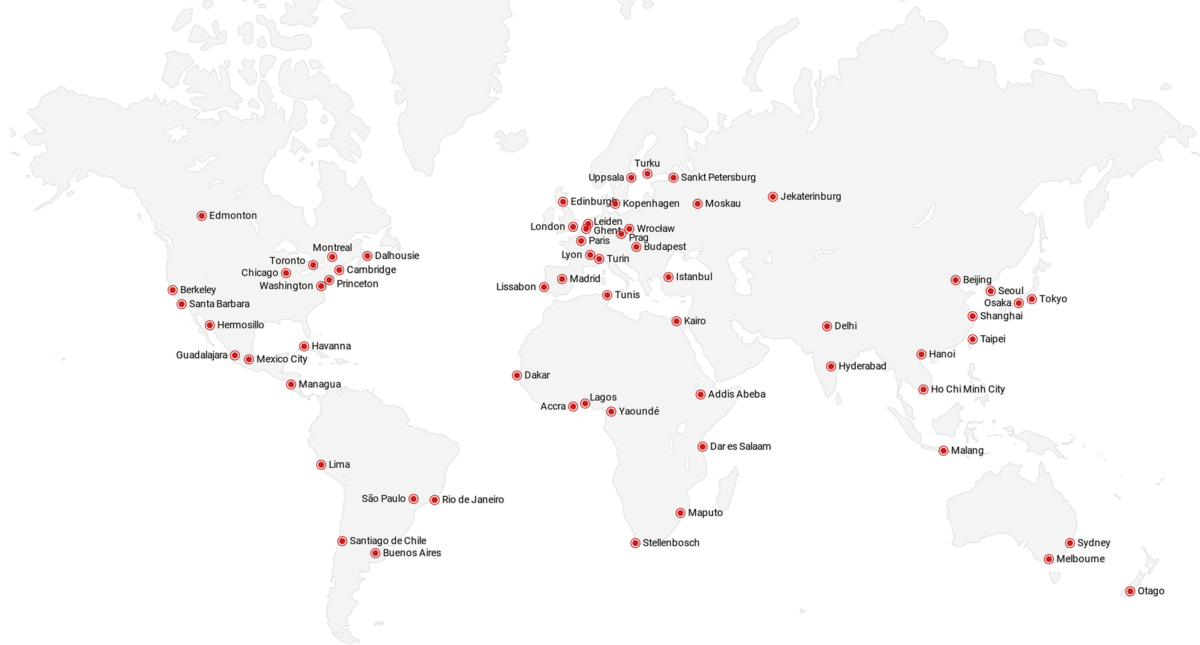As one of three ReCentGlobe labs, the Cooperation Lab takes account of the immense growth in the importance of international academic cooperation at universities. In line with Leipzig University's overall strategy for transregional academic cooperation, the lab plays a pioneering role for the humanities and social sciences.
The Cooperation Lab brings together very different formats - and thus the associated challenges - of cooperation in research and teaching: transregional and transnational research projects in very different geographical constellations, regional partnerships with university and non-university partners within Germany as well as cooperation in a variety of formats with over 100 partner institutions worldwide. In addition, there is cooperation within the framework of structured doctoral training, from which special challenges of cotutelle de thése procedures with foreign partners can arise, and finally, innovative forms of interaction in field, object and archive research must also be taken into consideration.
The lab was formed in 2021 under the leadership of Ulf Engel and Steffi Marung. The constituent meeting in April not only brought together representatives of the four ReCentGlobe research areas as well as the participating faculties, the Graduate School Global and Area Studies, the International Office, the coordination of large research networks in the ReCentGlobe such as SFB 1199 and the "Multiple Secularities" research group. Numerous representatives of the partner institutions also took part: within the partner institutions in the productive exchange on the concrete design of the Lab's strategic and content-related role, also as an advisory and support instrument for future and ongoing applications, vis-à-vis national and international research funders, but also vis-à-vis the university management and political actors - including the Max Planck Institute for Social Anthropology Halle, the Leibniz Institute for the History and Culture of Eastern Europe, the Leibniz Institute for Regional Geography and the Leibniz ScienceCampus "Eastern Europe - Global Area" as well as the Central German Forum for the Study of the Global Condition.
The Lab first of all prepares an analysis of the current situation and potential of its members' transregional cooperation activities in order to identify particular challenges and necessities and to coordinate these with the processes in the faculties. This infrastructure for transnational research projects, which is unique in the humanities and social sciences in Germany, pools experience and efforts in the large number of ongoing and planned projects. The discussions in the Lab also focused on the question of what conditions are required for successful regional and international cooperation in science and how the quality of such cooperation can be determined and promoted. In this exchange, a number of topics have already been identified on which the members of the Lab want to continue exchanging and coordinating, in particular:
- The time factor as a problem and resource: On the one hand, initiating academic collaborations requires time and other freedoms that cannot always be granted in everyday university life. Time (and not just money) is therefore an important resource. On the other hand, the tension between the temporal rhythms in the project-based funding of scientific collaborations and the long-term nature and sustainability of such relationships poses particular challenges. Here, the Lab could provide support in order to cushion the short-term rhythms of specific project funding through long-term institutional cooperation and to help compensate for interruptions in financial support in terms of content.
- The dialectic of promoting early career researchers (doctoral candidates and postdocs) and strategically supporting scientific collaborations: While the establishment of scientific networks should be conceived as part of the training of early career researchers, early career researchers are not only their objects, but also subjects: as initiators, generators and mediators of cooperative relationships - potentials that can be promoted and utilized.
- The visibility of cooperative relationships: By bundling efforts in public relations and science communication in the university and non-university landscape, positive effects can be expected here. This also applies to the challenges of research data management in regional and international collaborations.
The lab is to take on three important functions in the medium term:
- Communication: Exchange of information and experiences about ongoing and planned scientific collaborations between the members of ReCentGlobe and the colleagues in the operational area at Leipzig University, including circulation of information about calls for proposals or new cooperation formats, systematic storage and communication of best practices and lessons learned.
- Networking: Support in the initiation and implementation of cooperation projects by identifying potential partners at Leipzig University and in the region.
- Quality Management: Development of guidelines for successful scientific cooperation; advice and support for planned cooperation projects with regard to strategic and content-related embedding at Leipzig University.
Regional Network
- Forum for the Study of the Global Condition
- Leibniz Institute for the History and Culture of Eastern Europe, Leipzig
- Leibniz Institute for Regional Geography, Leipzig
- Leibniz Institute for Jewish History and Culture, Simon Dubnow, Leipzig
- Max Planck Institute for Social Anthropology, Halle
- Friedrich Schiller University of Jena
- Martin Luther University Halle-Wittenberg
- University of Erfurt
- Leibniz Sciencecampus (EEGA)
- Fraunhofer Center for International Management and Knowledge Economy, Leipzig
- Leibniz Institute for the History and Culture of Eastern Europe, Leipzig
- Leibniz Institute for Jewish History and Culture, Simon Dubnow, Leipzig
- Leibniz Institute for Regional Geography, Leipzig
- Max Planck Institute for Social Anthropology, Halle
- Leibniz Institute of Agricultural Development in Transition Economies, Halle
- Institute of Geography, Friedrich Schiller University, Jena
- Aleksander Brückner Center for Polish Studies at Martin Luther University Halle-Wittenberg and Friedrich Schiller University Jena (FSU)
(Inter)national Networks
Diese Seite befindet sich aktuell im Aufbau und wird ständig erweitert.
